Mutation: Types, Causes, Genetic Disorders, and Impact on Human Health
VerifiedAdded on 2022/09/21
|5
|1767
|15
Homework Assignment
AI Summary
This assignment provides a comprehensive overview of genetic mutations, which are alterations in the genetic material of a cell. It delves into the various types of mutations, including gene mutations and point mutations, and examines their underlying causes, such as errors in DNA replication and environmental factors like radiation. The assignment elaborates on the different types of point mutations, including substitution, deletion, and insertion, and explains how these changes can lead to significant alterations in protein structure and function. Furthermore, it explores real-world examples of genetic disorders caused by mutations, such as sickle-cell anemia, cystic fibrosis, and Tay-Sachs disease, providing insights into the specific mutations involved and their phenotypic consequences. The assignment also touches upon beta thalassemia. The assignment is well-referenced with sources from scientific journals and educational resources.
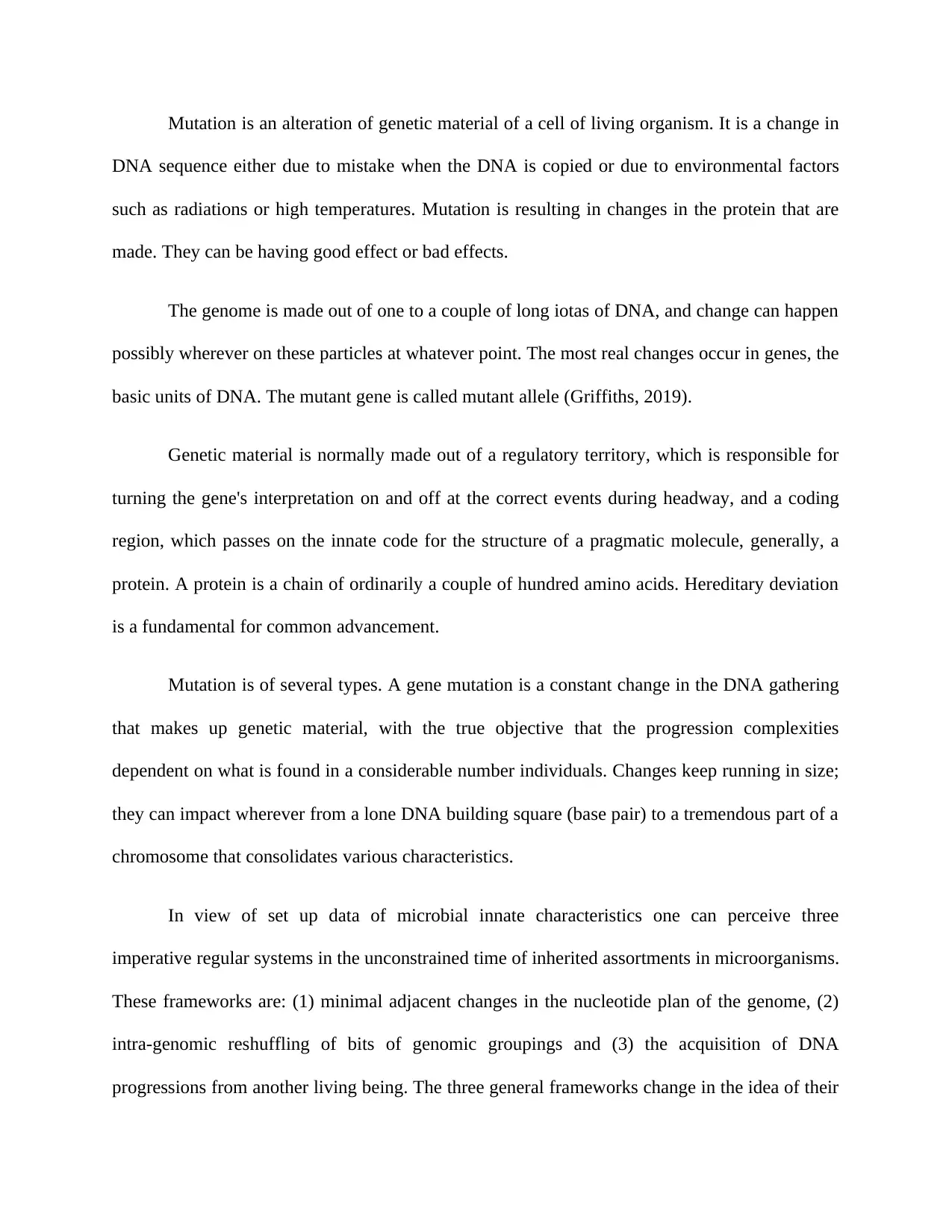
Mutation is an alteration of genetic material of a cell of living organism. It is a change in
DNA sequence either due to mistake when the DNA is copied or due to environmental factors
such as radiations or high temperatures. Mutation is resulting in changes in the protein that are
made. They can be having good effect or bad effects.
The genome is made out of one to a couple of long iotas of DNA, and change can happen
possibly wherever on these particles at whatever point. The most real changes occur in genes, the
basic units of DNA. The mutant gene is called mutant allele (Griffiths, 2019).
Genetic material is normally made out of a regulatory territory, which is responsible for
turning the gene's interpretation on and off at the correct events during headway, and a coding
region, which passes on the innate code for the structure of a pragmatic molecule, generally, a
protein. A protein is a chain of ordinarily a couple of hundred amino acids. Hereditary deviation
is a fundamental for common advancement.
Mutation is of several types. A gene mutation is a constant change in the DNA gathering
that makes up genetic material, with the true objective that the progression complexities
dependent on what is found in a considerable number individuals. Changes keep running in size;
they can impact wherever from a lone DNA building square (base pair) to a tremendous part of a
chromosome that consolidates various characteristics.
In view of set up data of microbial innate characteristics one can perceive three
imperative regular systems in the unconstrained time of inherited assortments in microorganisms.
These frameworks are: (1) minimal adjacent changes in the nucleotide plan of the genome, (2)
intra-genomic reshuffling of bits of genomic groupings and (3) the acquisition of DNA
progressions from another living being. The three general frameworks change in the idea of their
DNA sequence either due to mistake when the DNA is copied or due to environmental factors
such as radiations or high temperatures. Mutation is resulting in changes in the protein that are
made. They can be having good effect or bad effects.
The genome is made out of one to a couple of long iotas of DNA, and change can happen
possibly wherever on these particles at whatever point. The most real changes occur in genes, the
basic units of DNA. The mutant gene is called mutant allele (Griffiths, 2019).
Genetic material is normally made out of a regulatory territory, which is responsible for
turning the gene's interpretation on and off at the correct events during headway, and a coding
region, which passes on the innate code for the structure of a pragmatic molecule, generally, a
protein. A protein is a chain of ordinarily a couple of hundred amino acids. Hereditary deviation
is a fundamental for common advancement.
Mutation is of several types. A gene mutation is a constant change in the DNA gathering
that makes up genetic material, with the true objective that the progression complexities
dependent on what is found in a considerable number individuals. Changes keep running in size;
they can impact wherever from a lone DNA building square (base pair) to a tremendous part of a
chromosome that consolidates various characteristics.
In view of set up data of microbial innate characteristics one can perceive three
imperative regular systems in the unconstrained time of inherited assortments in microorganisms.
These frameworks are: (1) minimal adjacent changes in the nucleotide plan of the genome, (2)
intra-genomic reshuffling of bits of genomic groupings and (3) the acquisition of DNA
progressions from another living being. The three general frameworks change in the idea of their
Paraphrase This Document
Need a fresh take? Get an instant paraphrase of this document with our AI Paraphraser
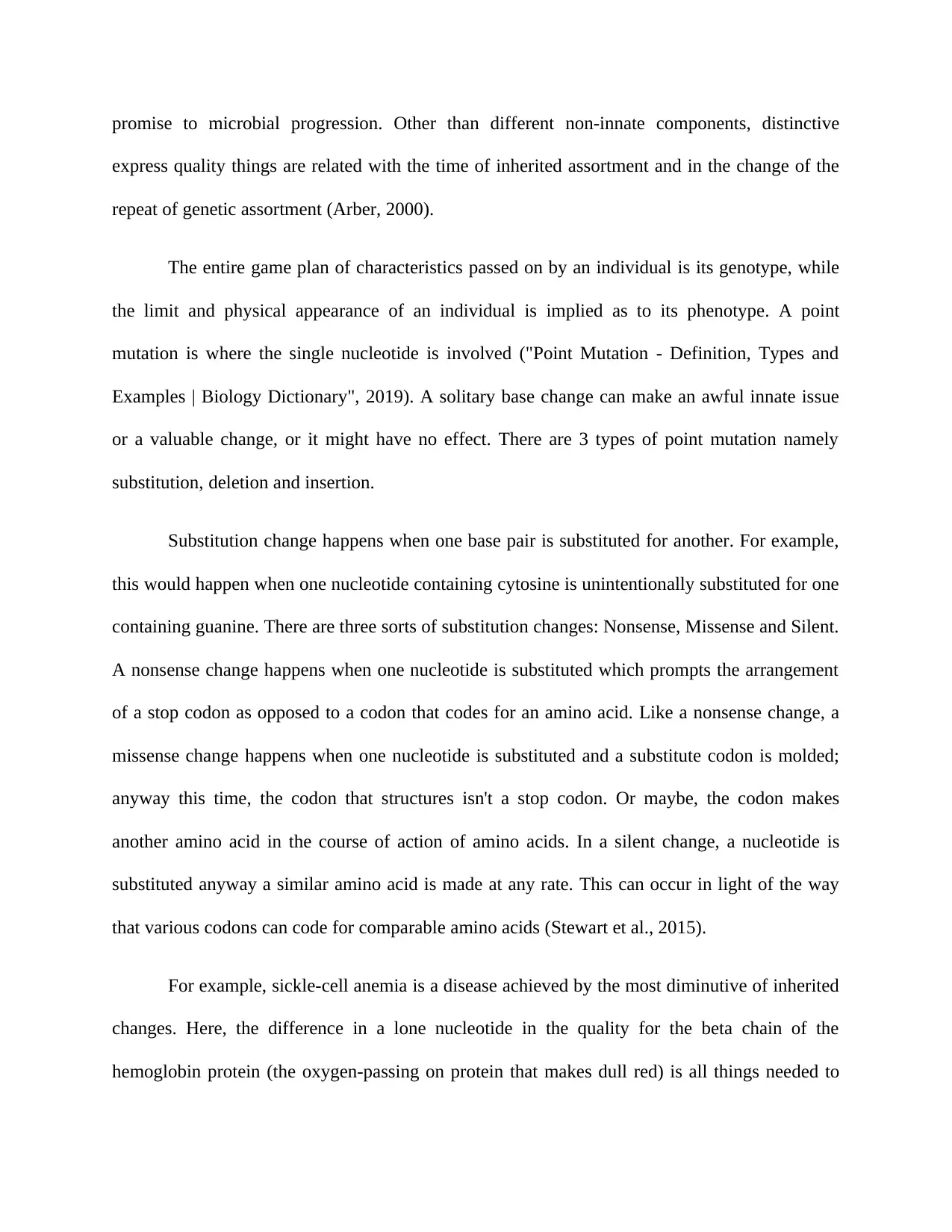
promise to microbial progression. Other than different non-innate components, distinctive
express quality things are related with the time of inherited assortment and in the change of the
repeat of genetic assortment (Arber, 2000).
The entire game plan of characteristics passed on by an individual is its genotype, while
the limit and physical appearance of an individual is implied as to its phenotype. A point
mutation is where the single nucleotide is involved ("Point Mutation - Definition, Types and
Examples | Biology Dictionary", 2019). A solitary base change can make an awful innate issue
or a valuable change, or it might have no effect. There are 3 types of point mutation namely
substitution, deletion and insertion.
Substitution change happens when one base pair is substituted for another. For example,
this would happen when one nucleotide containing cytosine is unintentionally substituted for one
containing guanine. There are three sorts of substitution changes: Nonsense, Missense and Silent.
A nonsense change happens when one nucleotide is substituted which prompts the arrangement
of a stop codon as opposed to a codon that codes for an amino acid. Like a nonsense change, a
missense change happens when one nucleotide is substituted and a substitute codon is molded;
anyway this time, the codon that structures isn't a stop codon. Or maybe, the codon makes
another amino acid in the course of action of amino acids. In a silent change, a nucleotide is
substituted anyway a similar amino acid is made at any rate. This can occur in light of the way
that various codons can code for comparable amino acids (Stewart et al., 2015).
For example, sickle-cell anemia is a disease achieved by the most diminutive of inherited
changes. Here, the difference in a lone nucleotide in the quality for the beta chain of the
hemoglobin protein (the oxygen-passing on protein that makes dull red) is all things needed to
express quality things are related with the time of inherited assortment and in the change of the
repeat of genetic assortment (Arber, 2000).
The entire game plan of characteristics passed on by an individual is its genotype, while
the limit and physical appearance of an individual is implied as to its phenotype. A point
mutation is where the single nucleotide is involved ("Point Mutation - Definition, Types and
Examples | Biology Dictionary", 2019). A solitary base change can make an awful innate issue
or a valuable change, or it might have no effect. There are 3 types of point mutation namely
substitution, deletion and insertion.
Substitution change happens when one base pair is substituted for another. For example,
this would happen when one nucleotide containing cytosine is unintentionally substituted for one
containing guanine. There are three sorts of substitution changes: Nonsense, Missense and Silent.
A nonsense change happens when one nucleotide is substituted which prompts the arrangement
of a stop codon as opposed to a codon that codes for an amino acid. Like a nonsense change, a
missense change happens when one nucleotide is substituted and a substitute codon is molded;
anyway this time, the codon that structures isn't a stop codon. Or maybe, the codon makes
another amino acid in the course of action of amino acids. In a silent change, a nucleotide is
substituted anyway a similar amino acid is made at any rate. This can occur in light of the way
that various codons can code for comparable amino acids (Stewart et al., 2015).
For example, sickle-cell anemia is a disease achieved by the most diminutive of inherited
changes. Here, the difference in a lone nucleotide in the quality for the beta chain of the
hemoglobin protein (the oxygen-passing on protein that makes dull red) is all things needed to
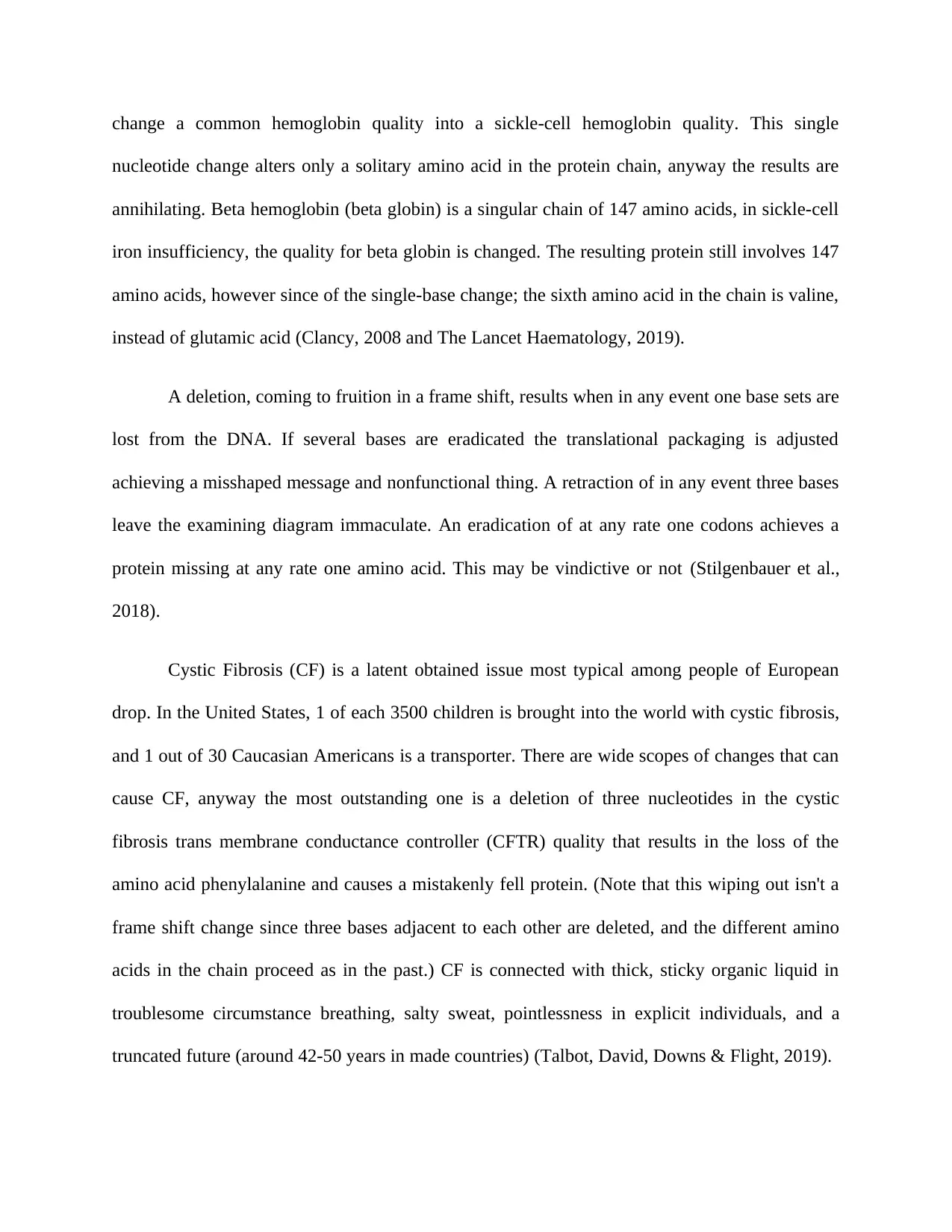
change a common hemoglobin quality into a sickle-cell hemoglobin quality. This single
nucleotide change alters only a solitary amino acid in the protein chain, anyway the results are
annihilating. Beta hemoglobin (beta globin) is a singular chain of 147 amino acids, in sickle-cell
iron insufficiency, the quality for beta globin is changed. The resulting protein still involves 147
amino acids, however since of the single-base change; the sixth amino acid in the chain is valine,
instead of glutamic acid (Clancy, 2008 and The Lancet Haematology, 2019).
A deletion, coming to fruition in a frame shift, results when in any event one base sets are
lost from the DNA. If several bases are eradicated the translational packaging is adjusted
achieving a misshaped message and nonfunctional thing. A retraction of in any event three bases
leave the examining diagram immaculate. An eradication of at any rate one codons achieves a
protein missing at any rate one amino acid. This may be vindictive or not (Stilgenbauer et al.,
2018).
Cystic Fibrosis (CF) is a latent obtained issue most typical among people of European
drop. In the United States, 1 of each 3500 children is brought into the world with cystic fibrosis,
and 1 out of 30 Caucasian Americans is a transporter. There are wide scopes of changes that can
cause CF, anyway the most outstanding one is a deletion of three nucleotides in the cystic
fibrosis trans membrane conductance controller (CFTR) quality that results in the loss of the
amino acid phenylalanine and causes a mistakenly fell protein. (Note that this wiping out isn't a
frame shift change since three bases adjacent to each other are deleted, and the different amino
acids in the chain proceed as in the past.) CF is connected with thick, sticky organic liquid in
troublesome circumstance breathing, salty sweat, pointlessness in explicit individuals, and a
truncated future (around 42-50 years in made countries) (Talbot, David, Downs & Flight, 2019).
nucleotide change alters only a solitary amino acid in the protein chain, anyway the results are
annihilating. Beta hemoglobin (beta globin) is a singular chain of 147 amino acids, in sickle-cell
iron insufficiency, the quality for beta globin is changed. The resulting protein still involves 147
amino acids, however since of the single-base change; the sixth amino acid in the chain is valine,
instead of glutamic acid (Clancy, 2008 and The Lancet Haematology, 2019).
A deletion, coming to fruition in a frame shift, results when in any event one base sets are
lost from the DNA. If several bases are eradicated the translational packaging is adjusted
achieving a misshaped message and nonfunctional thing. A retraction of in any event three bases
leave the examining diagram immaculate. An eradication of at any rate one codons achieves a
protein missing at any rate one amino acid. This may be vindictive or not (Stilgenbauer et al.,
2018).
Cystic Fibrosis (CF) is a latent obtained issue most typical among people of European
drop. In the United States, 1 of each 3500 children is brought into the world with cystic fibrosis,
and 1 out of 30 Caucasian Americans is a transporter. There are wide scopes of changes that can
cause CF, anyway the most outstanding one is a deletion of three nucleotides in the cystic
fibrosis trans membrane conductance controller (CFTR) quality that results in the loss of the
amino acid phenylalanine and causes a mistakenly fell protein. (Note that this wiping out isn't a
frame shift change since three bases adjacent to each other are deleted, and the different amino
acids in the chain proceed as in the past.) CF is connected with thick, sticky organic liquid in
troublesome circumstance breathing, salty sweat, pointlessness in explicit individuals, and a
truncated future (around 42-50 years in made countries) (Talbot, David, Downs & Flight, 2019).
⊘ This is a preview!⊘
Do you want full access?
Subscribe today to unlock all pages.

Trusted by 1+ million students worldwide
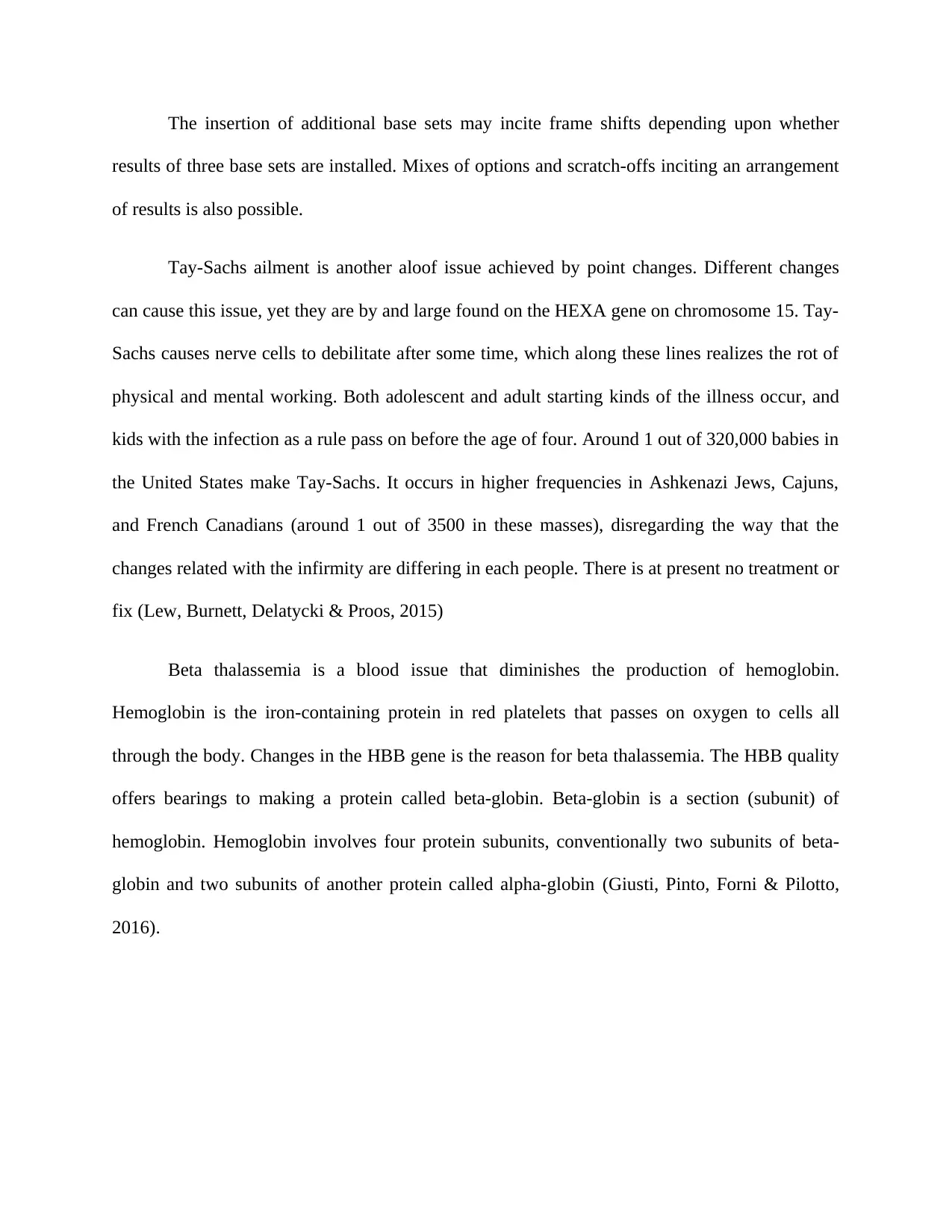
The insertion of additional base sets may incite frame shifts depending upon whether
results of three base sets are installed. Mixes of options and scratch-offs inciting an arrangement
of results is also possible.
Tay-Sachs ailment is another aloof issue achieved by point changes. Different changes
can cause this issue, yet they are by and large found on the HEXA gene on chromosome 15. Tay-
Sachs causes nerve cells to debilitate after some time, which along these lines realizes the rot of
physical and mental working. Both adolescent and adult starting kinds of the illness occur, and
kids with the infection as a rule pass on before the age of four. Around 1 out of 320,000 babies in
the United States make Tay-Sachs. It occurs in higher frequencies in Ashkenazi Jews, Cajuns,
and French Canadians (around 1 out of 3500 in these masses), disregarding the way that the
changes related with the infirmity are differing in each people. There is at present no treatment or
fix (Lew, Burnett, Delatycki & Proos, 2015)
Beta thalassemia is a blood issue that diminishes the production of hemoglobin.
Hemoglobin is the iron-containing protein in red platelets that passes on oxygen to cells all
through the body. Changes in the HBB gene is the reason for beta thalassemia. The HBB quality
offers bearings to making a protein called beta-globin. Beta-globin is a section (subunit) of
hemoglobin. Hemoglobin involves four protein subunits, conventionally two subunits of beta-
globin and two subunits of another protein called alpha-globin (Giusti, Pinto, Forni & Pilotto,
2016).
results of three base sets are installed. Mixes of options and scratch-offs inciting an arrangement
of results is also possible.
Tay-Sachs ailment is another aloof issue achieved by point changes. Different changes
can cause this issue, yet they are by and large found on the HEXA gene on chromosome 15. Tay-
Sachs causes nerve cells to debilitate after some time, which along these lines realizes the rot of
physical and mental working. Both adolescent and adult starting kinds of the illness occur, and
kids with the infection as a rule pass on before the age of four. Around 1 out of 320,000 babies in
the United States make Tay-Sachs. It occurs in higher frequencies in Ashkenazi Jews, Cajuns,
and French Canadians (around 1 out of 3500 in these masses), disregarding the way that the
changes related with the infirmity are differing in each people. There is at present no treatment or
fix (Lew, Burnett, Delatycki & Proos, 2015)
Beta thalassemia is a blood issue that diminishes the production of hemoglobin.
Hemoglobin is the iron-containing protein in red platelets that passes on oxygen to cells all
through the body. Changes in the HBB gene is the reason for beta thalassemia. The HBB quality
offers bearings to making a protein called beta-globin. Beta-globin is a section (subunit) of
hemoglobin. Hemoglobin involves four protein subunits, conventionally two subunits of beta-
globin and two subunits of another protein called alpha-globin (Giusti, Pinto, Forni & Pilotto,
2016).
Paraphrase This Document
Need a fresh take? Get an instant paraphrase of this document with our AI Paraphraser
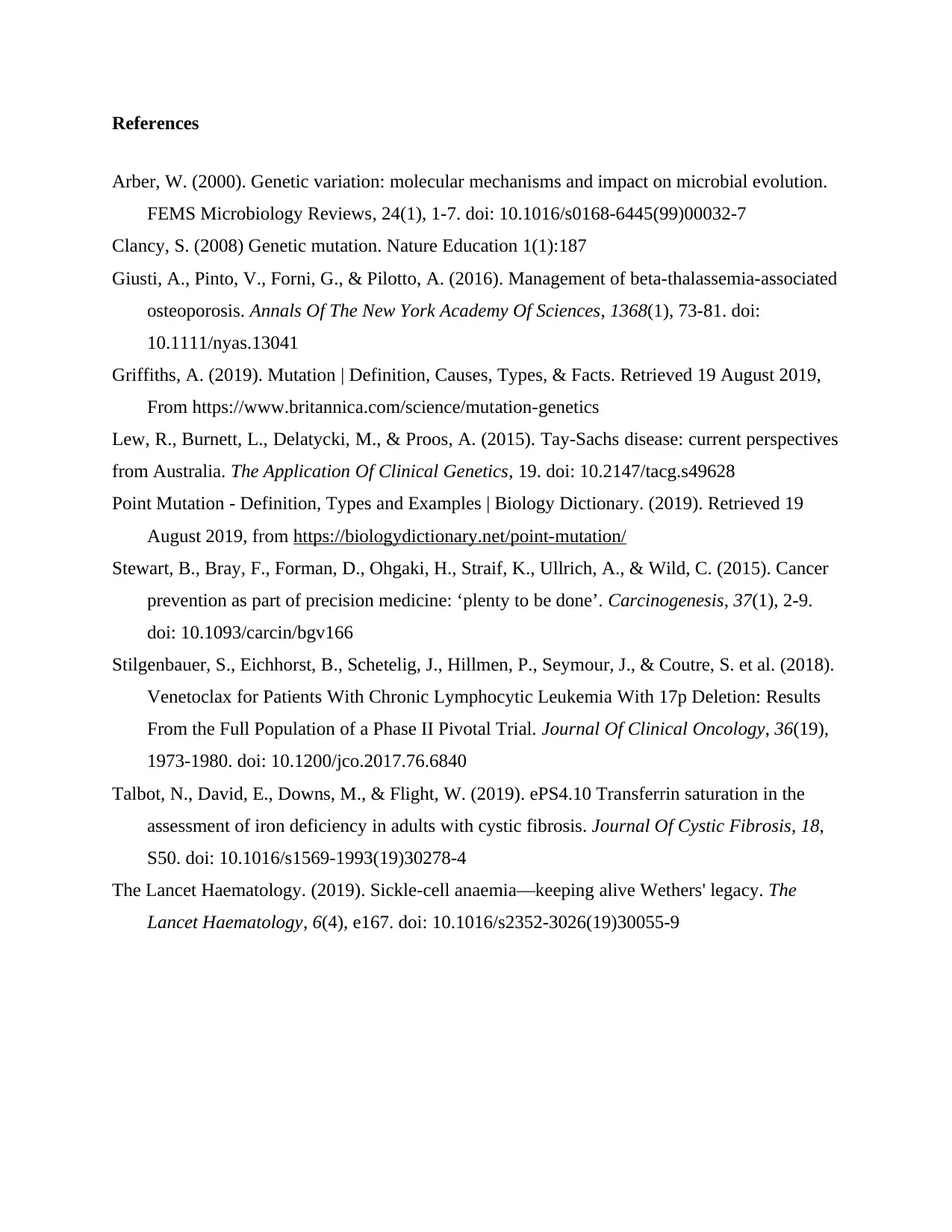
References
Arber, W. (2000). Genetic variation: molecular mechanisms and impact on microbial evolution.
FEMS Microbiology Reviews, 24(1), 1-7. doi: 10.1016/s0168-6445(99)00032-7
Clancy, S. (2008) Genetic mutation. Nature Education 1(1):187
Giusti, A., Pinto, V., Forni, G., & Pilotto, A. (2016). Management of beta-thalassemia-associated
osteoporosis. Annals Of The New York Academy Of Sciences, 1368(1), 73-81. doi:
10.1111/nyas.13041
Griffiths, A. (2019). Mutation | Definition, Causes, Types, & Facts. Retrieved 19 August 2019,
From https://www.britannica.com/science/mutation-genetics
Lew, R., Burnett, L., Delatycki, M., & Proos, A. (2015). Tay-Sachs disease: current perspectives
from Australia. The Application Of Clinical Genetics, 19. doi: 10.2147/tacg.s49628
Point Mutation - Definition, Types and Examples | Biology Dictionary. (2019). Retrieved 19
August 2019, from https://biologydictionary.net/point-mutation/
Stewart, B., Bray, F., Forman, D., Ohgaki, H., Straif, K., Ullrich, A., & Wild, C. (2015). Cancer
prevention as part of precision medicine: ‘plenty to be done’. Carcinogenesis, 37(1), 2-9.
doi: 10.1093/carcin/bgv166
Stilgenbauer, S., Eichhorst, B., Schetelig, J., Hillmen, P., Seymour, J., & Coutre, S. et al. (2018).
Venetoclax for Patients With Chronic Lymphocytic Leukemia With 17p Deletion: Results
From the Full Population of a Phase II Pivotal Trial. Journal Of Clinical Oncology, 36(19),
1973-1980. doi: 10.1200/jco.2017.76.6840
Talbot, N., David, E., Downs, M., & Flight, W. (2019). ePS4.10 Transferrin saturation in the
assessment of iron deficiency in adults with cystic fibrosis. Journal Of Cystic Fibrosis, 18,
S50. doi: 10.1016/s1569-1993(19)30278-4
The Lancet Haematology. (2019). Sickle-cell anaemia—keeping alive Wethers' legacy. The
Lancet Haematology, 6(4), e167. doi: 10.1016/s2352-3026(19)30055-9
Arber, W. (2000). Genetic variation: molecular mechanisms and impact on microbial evolution.
FEMS Microbiology Reviews, 24(1), 1-7. doi: 10.1016/s0168-6445(99)00032-7
Clancy, S. (2008) Genetic mutation. Nature Education 1(1):187
Giusti, A., Pinto, V., Forni, G., & Pilotto, A. (2016). Management of beta-thalassemia-associated
osteoporosis. Annals Of The New York Academy Of Sciences, 1368(1), 73-81. doi:
10.1111/nyas.13041
Griffiths, A. (2019). Mutation | Definition, Causes, Types, & Facts. Retrieved 19 August 2019,
From https://www.britannica.com/science/mutation-genetics
Lew, R., Burnett, L., Delatycki, M., & Proos, A. (2015). Tay-Sachs disease: current perspectives
from Australia. The Application Of Clinical Genetics, 19. doi: 10.2147/tacg.s49628
Point Mutation - Definition, Types and Examples | Biology Dictionary. (2019). Retrieved 19
August 2019, from https://biologydictionary.net/point-mutation/
Stewart, B., Bray, F., Forman, D., Ohgaki, H., Straif, K., Ullrich, A., & Wild, C. (2015). Cancer
prevention as part of precision medicine: ‘plenty to be done’. Carcinogenesis, 37(1), 2-9.
doi: 10.1093/carcin/bgv166
Stilgenbauer, S., Eichhorst, B., Schetelig, J., Hillmen, P., Seymour, J., & Coutre, S. et al. (2018).
Venetoclax for Patients With Chronic Lymphocytic Leukemia With 17p Deletion: Results
From the Full Population of a Phase II Pivotal Trial. Journal Of Clinical Oncology, 36(19),
1973-1980. doi: 10.1200/jco.2017.76.6840
Talbot, N., David, E., Downs, M., & Flight, W. (2019). ePS4.10 Transferrin saturation in the
assessment of iron deficiency in adults with cystic fibrosis. Journal Of Cystic Fibrosis, 18,
S50. doi: 10.1016/s1569-1993(19)30278-4
The Lancet Haematology. (2019). Sickle-cell anaemia—keeping alive Wethers' legacy. The
Lancet Haematology, 6(4), e167. doi: 10.1016/s2352-3026(19)30055-9
1 out of 5
Related Documents
Your All-in-One AI-Powered Toolkit for Academic Success.
+13062052269
info@desklib.com
Available 24*7 on WhatsApp / Email
![[object Object]](/_next/static/media/star-bottom.7253800d.svg)
Unlock your academic potential
Copyright © 2020–2026 A2Z Services. All Rights Reserved. Developed and managed by ZUCOL.





